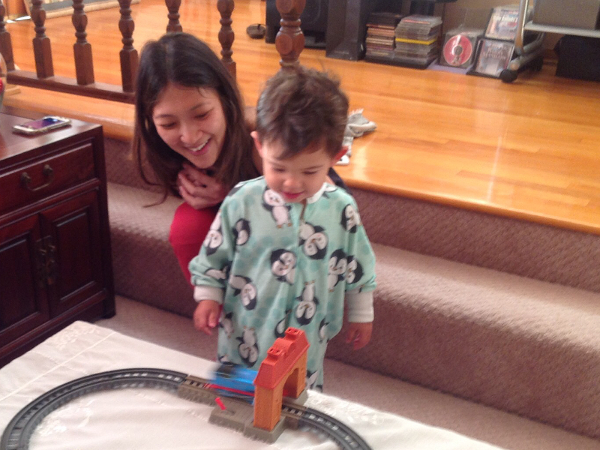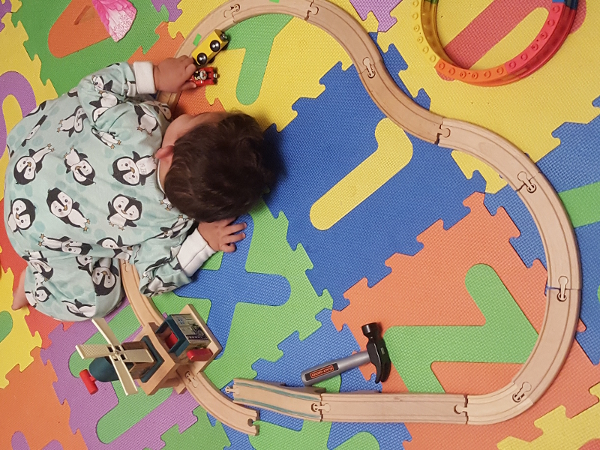I am an endless knowledge seeker, so on first pass, I naturally scoff at the notion that somehow ignorance is bliss. As such, on face value, “is ignorance bliss?” seems like an asinine question. My desire to educate myself on how to be happy has fueled my involvement with the International Positive Psychology Association and my study of academic thought leaders in this space — people like Martin Seligman, Ed Diener, and Barbara Fredrickson — to learn ways to be happier. However, lately, I have observed that there are a lot of instances where more information leads to dismay. At a basic level, I watched my one-year-old son thoroughly enjoy a simple train set for months.

There is a great store where we live that has cheap, recycled toy train parts, so my wife and I continued to introduce train pieces and have made my son’s set more robust over the past few months. We loved doing it for him because he couldn’t get enough… until the day he did. As we continued to add disparate train pieces with the best of intentions, some trains do not fit certain tracks — some trains fit the existing track but are too tall to go under the existing bridge that came with the original set. What has ensued is confusion and frustration. I have let it go on because I think the development of problem-solving outweighs the loss of bliss my son used to achieve when the set was simply enjoyable. However, this loss of bliss is observably noticeable and therefore significant. We are basically making my son unhappy by introducing new information.
Scientifically, happiness is a choice. It is a choice about where your single processor brain will devote its finite resources as you process the world. —Shawn Achor
Have you ever found yourself in a supermarket, surrounded by an aisle of different choices, wishing there was only one choice available? Science tells us endless options can be anxiety-provoking. When faced with a choice, we use a lot of energy to make our final choice. When there is an abundance of choice, the cost is an increased chance that you will regret your final decision later. If you want to feel like you made a solid choice, you need to scrutinize all the available information you have available and then (once you process all this information) make your decision. But, as a general rule, does more information actually contribute to a more satisfactory outcome? How much information do we need to make an informed decision, engage in play, achieve flow, take action or simply be happy?
The topic of choice touches on different areas of our personal and professional life. Choice contributes to our happiness, as well as our social arrangements. We can view the argument of “ignorance is bliss” through the lenses of behavioral psychology, philosophy, politics, education and marketing sciences. The topic is provocative since it juxtaposes our general wish for autonomy with a more paternalistic and prescriptive view. In a world that is filled with seemingly constant impulses and endless options, we would often like to believe we are happier when we have all the information. However, this might not always be congruent with the desire to reduce our stress and feel balanced.
When Choosing Feels like Losing
The paradox of choice is not a new phenomenon; we can observe it in different areas of our lives, from the food we eat to who we are attracted to. Nowadays, there are so many options available to us in every aspect of our life. If you are not completely satisfied or happy, why not dump what you have and replace it (or even him/her) with another version? Why should you practice discipline and perseverance when it is so easy to find yourself a superior model to what you have now? Psychologist Barry Schwartz wrote extensively about the paradox of choice and argues that Americans do not seem to be benefiting from all the choice that is available to us (Schwartz, 2004).
Various research also shows us that when more choice is available, we are more likely to be dissatisfied with what we finally choose. Jonathan D’Angelo and Catalina Toma (2016) explored this idea in their study of online dating. When participants selected their dates from a larger set of people, they were more doubtful about their dating choice a week later (when compared to those who had fewer potential partners to choose from). A similar observation has been made in marketing. Studies show that people who spend more time deliberating about a decision can later feel a sense of loss towards the options they did not pick. During what we perceive to be a careful selection process, we develop a sense of attachment to our decisions, which researchers believe might be harmful to our well-being (Carmon, Wertenbroch, & Zeelenberg, 2003). The premise “choosing feels like losing” has been introduced. Choosing from a set of options can lead us to a feeling of post-choice discomfort. Once we opt for one option, we no longer possess the other — that’s just a fact. Instead of feeling a sense of relief about finally making a decision, we let negative feelings creep in and we start to feel dissatisfied. Rebecca Ratner of the University of Maryland and her colleagues explored different strategies that can help us help others in their decision-making process. They indicate that providing good information is one of them, but restricting options or adding restrictive options are also recommended (Ratner et al., 2008). For instance, pre-committing to a choice can free us from having to face the decision later, and can also help with self-control when more options become available. It is part of the science that makes restrictive diets like WHOLE30 episodically successful. Simply put, if we can manufacture a predisposition to making (and sticking with) a decision it makes our life a lot less challenging.
When Are You Most Free to Make Autonomous Choices?
Although we all generally value autonomy, there appears to be some ambivalence surrounding this topic. For instance, in education, some studies of problem-based learning showed that while students welcomed some degree of autonomy afforded by this technique, they were also engaged during more prescriptive approaches to studying (Harmer & Stokes, 2016). It appears that paternalism can sometimes free our energy to engage in life in a more efficient way.
From a philosophical stance, there is also a vibrant debate about what constitutes a choice. It is pretty easy to find critics anytime the idea of a “forced choice” is brought up. For example, in the West, we have the freedom to choose (and this is widely lauded). However, sometimes, there is the subtle (unspoken) condition that we ought to choose the right thing. If we fail to do that, we can be ostracized and, and in a way we lose some of our freedom to choose (Žižek, 1989). How many “forced choices” do we make just to remain a part of our community (or “tribe”) and conform to the expectations of our environment? In choice, too, there appears to be a degree of ignorance we are willing to accept to “keep the peace” and avoid the cognitive dissidence of malalignment with the philosophy of our peers.
So a strong scientific argument can be made that a plethora of choices can create decision fatigue. Our mind simply cannot cope with an endless amount of information; our decision capacity runs out, and at this point, we run the risk of making bad decisions. Our mood can worsen when we are faced with too many choices as well. Research shows that too much choice leads to suboptimal decisions (Schwartz, 2004). Therefore, significant decisions should not be made when we are fatigued or in a bad mood. This was illustrated by a study of judicial decisions conducted at four major prisons in Israel (Danziger, Levav, & Avnaim-Pesso, 2011). The authors examined parole decisions made by experienced judges. It transpired that having a break (thus feeling less fatigued) influenced the judges’ ruling. More favorable decisions were made in the mornings (at the start of the workday) and after food breaks — this pattern was predictable, possibly confirming our need to rest and replenish our energy before making an important decision. It appears a good decision can sometimes be more about the timing, and less about the choices we are presented with. The saying “sleep on it” might sound simplistic, but it has some scientific credence.
Then, there is the scientific theory behind choice architecture. If you are interested in going down the rabbit hole of choice and well-being, I suggest following Brian Wansink. In various studies, Dr. Wansink has shown that if you crowd out the ability to make bad decisions by rigging your environment towards a bias to make good ones, you can steer yourself and/or others towards healthy behaviors (never the wiser that they’ve been unwittingly influenced). As I became aware firsthand in my study about workplace wellness strategies, people do not like to know their choices have been limited; however, if the reduction of choice is unobserved, one can rig the system for people to make specific decisions (arguably in their best interest) based on controlling the information available to them.
When Are You Most Free to Be Creative?
A study by Associate Professors Anne-Laure Sellier and Darren W. Dahl challenged the established belief that having more choice fuels creativity. They conducted two experiments that focused on knitting and crafting. The selection of creative inputs was increased from moderate to extensive: a bigger selection of yarn colors in the case of knitting; and a larger selection of shapes for a Christmas tree decoration in the case of crafting. Interestingly, the creative output of experienced and knowledgeable participants was negatively affected by more choice. Those who were less experienced, on the other hand, didn’t seem to be affected by the change in choice but it did not enhance their experience either. The authors concluded that restricted choice could be better for creative success as it allows us to focus more — and actually enjoy the creative process more — particularly if already experienced or skilled in that pursuit (Sellier & Dahl, 2011).
One of my heroes, Mihalyi Csikszentmihalyi, a couple of decades ago wrote how restricting choice could reduce stress and anxiety. Choice does give us the feeling that we can be more creative. However, this feeling is just that — a feeling — it is generally an illusion. Science suggests we have more difficulty focusing and enjoying an activity when provided with an extensive choice.
Is Ignorance Bliss?

Science tends to back up why my wife and I might have been unintentional wet blankets. When we have too much information, we risk the potential of decision paralysis. In this sense, ignorance is bliss. With too much structure we are given less room to follow our creative paths, engage in flow and — let’s face it — sometimes enjoy ourselves. Other studies by Darren Dahl also highlighted that the highest level of enjoyment is achieved when there is a right balance between restriction (e.g. providing limits around a task) and the freedom to create with autonomy (Dahl & Moreau, 2007). It is important to note that while researching this topic has in no way curtailed my thirst for knowledge, but it has garnered a new respect for the relationship our happiness has with information and choice. For many of us, happiness is a choice. We don’t need to be ignorant to be blissful, but waiting around for the right information does not appear to help any either. To contrary, in some cases, it may do the opposite.
Sources & further reading:
Csikszentmihalyi, M. (1990). Flow: The Psychology of Optimal Experience. New York: Harper and Row.
Schwartz, B. (2004). The Paradox of Choice: Why More is Less. New York: Harper Collins Publishers.
Žižek, S. (1989). The Sublime Object of Ideology. London: Verso Books.
